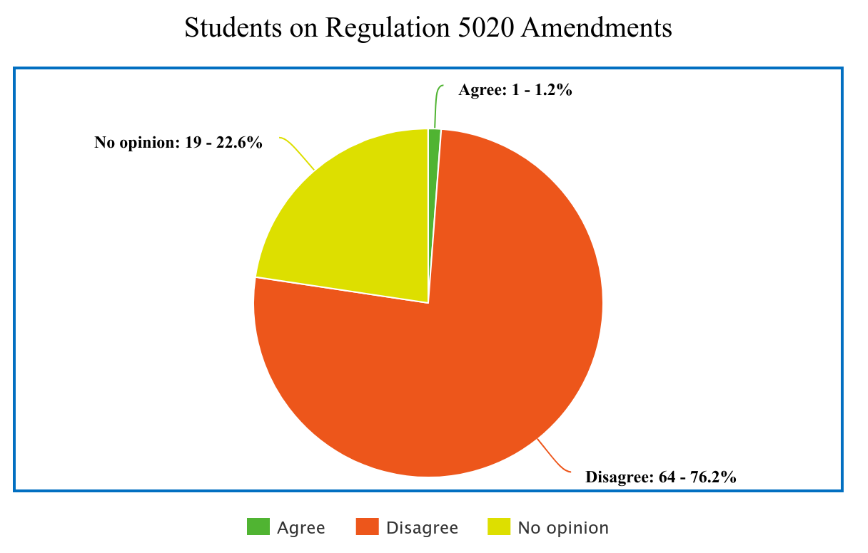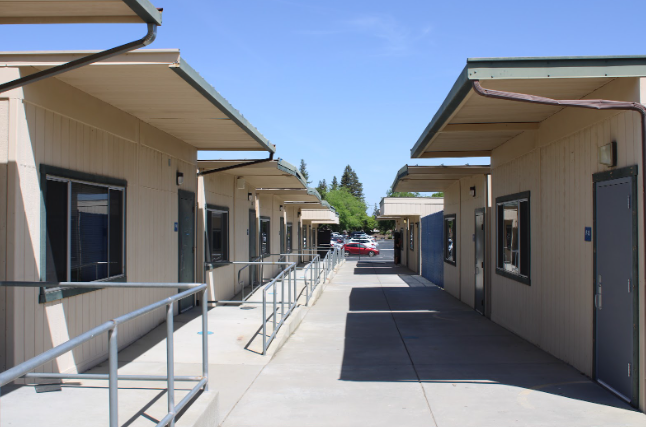“More parent involvement isn’t always a bad thing, but I think there can be more harm than good done from it,” Oakmont senior Viktoriya Rotaru said.
On Nov. 9, 2023, the Roseville Joint Union High School District (RJUHSD) school board met to discuss the implementation of an addition to parent notification policies. RJUHSD Regulation 5020: Parent Rights and Responsibilities (red text signifies changes made from the original wording) was revised to expand the situations in which parents would be notified of their child missing class.
The most notable change in these revisions is in item 10. Originally, this notification policy coincided with Education Code 51101.1, detailing the parental right “to be notified on a timely basis if their child is absent from school without permission.” This regulation has now been expanded to include parental right to be notified if their child “misses class time to meet with their counselor or visit the site Wellness Center.”
“The new parent notification policy extends existing language that requires parents to be notified when a student is absent from class,” Oakmont principal Dr. Isabel Govea said. “The policy now includes us notifying families when a student misses instructional time to go to the counseling office or the Wellness Center.”
Throughout the district, on-campus Wellness Centers provide a space where students may take a short break from class, talk to a mental health professional, or access various mental health related resources during school hours. Additionally, the wellness centers offer various support groups and guardian resources. Focusing on students’ social, emotional, and academic wellness, these centers ultimately work to provide another support system for all individuals who choose to utilize the offered services, guiding them back to a healthy and efficient academic career.
Starting on Feb. 26, students who visit their counselor or the Wellness Center during class time will be asked to digitally sign in. This will prompt an update in the Aeries attendance system, as a tardy or absence would, signifying that the student spent time at either the Wellness Center or a counselor’s office. This will be followed up with an automated voice message to parents or guardians informing them of their child’s location during class.
“This may be something that provokes some really great conversations between parents and their students in some cases,” Oakmont High School counselor Bethany Olander said. “But there are individual situations where I think students are not really ready to talk to their family members about certain things.”
A concern that was touched on by both Oakmont faculty and students was the possibility of this policy minimizing student opportunity to communicate in their own time.
“We’re not giving them the opportunity to navigate how and when to communicate with their families if that’s something that they’re not doing,” Oakmont teacher Nicole Haynes said.
Oakmont senior Sarah Jabbarnia reflected this in a description of a circumstance in which a student’s losing the ability to choose how and when to communicate may have had detrimental consequences.
“My best friend is transgender, and I’ve seen him go through this experience for the past six years,” Jabbarnia said. “If his parents were notified four years ago, before he came out to them, I don’t know if he would still be with me here today.”
Ultimately, this policy does not violate any minor consent laws, as the content of the meeting will remain entirely confidential without student consent. However, concern has been expressed over whether or not parents or guardians being informed of a meeting infringes on the privacy rights afforded to students.
“I think there’s a piece that we’ve all kind of wrestled with. Is the fact that a meeting happened confidential, or is the content of the meeting what needs to remain confidential?” Olander said. “I think there’s some gray area there.”
There are exceptions to this policy. In extreme cases where a student is in immediate harm if their parent or guardian is notified, or in situations where CPS or the police will be contacted, a counselor/wellness center staff member and certain admin can discuss and decide the course of action best suited for protecting the rights and safety of a student.
The revisions to the RJUHSD Regulation 5020 expand upon the language of California’s Education Code 51101.1, enumerating parent rights to know when their student is missing instructional time by visiting the Wellness Center or their school counselor.
At the RJUHSD board meeting on Nov. 9, the amendments to Regulation 5020 were opened for public comment, discussion, and board voting.
“I think the most important thing to point out with this is that this is if the child is missing class and they are not receiving the education that the parents are assuming is happening when they are at school,” RJUHSD school board member Marla Franz said. “This isn’t about discouraging kids from going at all, this is about missing class time, which EdCode does say we are supposed to tell parents.”
Similar support was expressed by parents, teachers, and board members on behalf of parental rights and encouragement of communication within families.
At the same meeting, however, Oakmont’s ASB School Board Representative George Buljan questioned the transparency of this policy and its implications about the importance of different school services.
“Does [parent notification from missing class] also mean that they are going to be notified every single time their student goes to the restroom and they are missing class?” Buljan said. “In student government, there’s been multiple times this year where I have to skip a little bit of another class. Will my parents be notified when I am out of class to have a [student government] meeting?”
This sentiment was also expressed by Oakmont senior Aidan Cusack after the board meeting.
“I think if they’re going to hold a double standard where they consider parts of attendance and not other parts, it’s obviously being framed in such a way as to avoid backlash,” Cusack said.
At the Nov. 9 meeting, school board president Pete Constant further addressed the attendance aspect of this policy, clarifying that parents will not be notified if their student visits a counselor or the wellness center before school, during lunch, or after school.
A district-wide notification was sent out to all students, parents, and guardians on Feb. 16 containing information about the new parent notification policy. This policy will go into effect on Feb. 26, the day RJUHSD returns from a week-long school break.
Students and faculty at Oakmont High School, both in support of and against this policy, acknowledged the uncertainty, worry, and hope they hold over the effects of this policy.
“If a student is struggling with something, hopefully their parents are their biggest advocates,” Oakmont teacher Traci Montgomery said. “[I hope] the counselors and Wellness Centers will work with the student in the best way to open up to the parents and share what’s going on with them.”
This recognition of the counselors’ and wellness center members’ responsibility to work with students to encourage communication with their parents was touched on by other faculty as well. Alongside this hope, concern was also noted by some in reference to the policy possibly discouraging students from using the resources and support provided by the Wellness Center and counselors.
“I worry that some students may choose not to seek wellness services that they need because they’re worried about the repercussions of that,” an Oakmont faculty member who chose to remain anonymous said. “I have to believe that some parents will respond calmly and with gratitude that they have this information, but of course, you can never predict what someone will or will not do.”
Oakmont English teacher Nicole Haynes expressed a similar apprehension about this policy bringing about student hesitancy to seek mental health services.
“I am most concerned that it will be a deterrent for students to seek the support or services either from their guidance counselor or from the wellness center,” Haynes said. “One student that misses out on something they really need is one too many”
An overarching concern was additionally noted by multiple students: this policy may discourage students from using wellness resources and encourage parent rights even at the risk of student safety, comfort, and privacy.
“If families undervalue [mental health] or don’t think that it’s important, you don’t want the school to be responsible for tensions in the home,” Cusack said. “I feel like it’s a situation where we should maybe value the student’s mental health over the parent always having exact knowledge of what’s going on at school.”
Addressing this general concern, board members stated at the Nov. 9 meeting that reevaluation will take place. When revisited, observed unintended consequences from this policy may lead to further amendment.
“Anytime there is change, there is a natural tendency to be worried about what that change will entail,” Dr. Govea said. “My job includes monitoring and evaluating the implementation of all policies on my campus and providing feedback to the district office. I think I will have a better idea of what effect this will have on all our stakeholders once the implementation has started and we can evaluate it over time.”


















(Anon) • Feb 17, 2024 at 11:33 am
This rule blatantly targets transgender students. Sad to see so many Oakmont staff support the mistreatment of those who they are supposed to help. Didn’t think I’d see the day where the wellness center is to the students detriment.